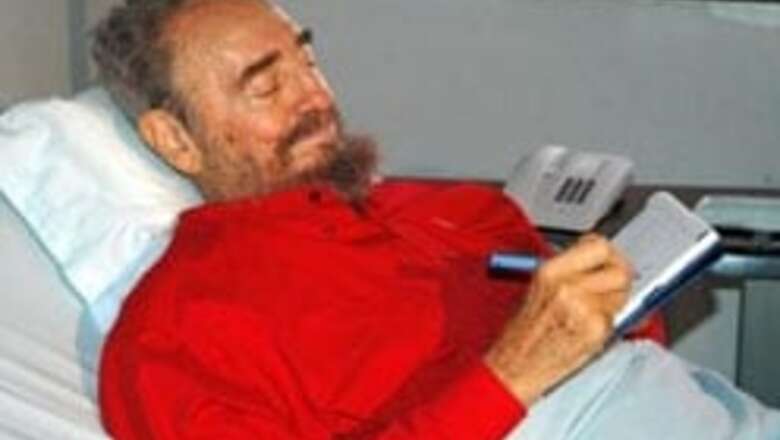
views
Miami: Cuban leader Fidel Castro has long prided himself on Cuba's doctors and free public health care system, but that system seems to have let him down after he fell ill in July , US-based doctors said on Tuesday.
Based on a report in Tuesday's edition of Spain's El Pais newspaper, the doctors -- who have no first-hand knowledge of Castro's condition said that Castro had received questionable or even botched care at the hands of health experts on his communist-ruled island.
"It's not a good story. Too bad they didn't send him to Miami for surgery," said Dr Charles Gerson, a clinical professor of medicine in the gastroenterology division of New York's Mt Sinai School of Medicine.
According to two medical sources cited by El Pais, the veteran revolutionary was in "very serious" condition after three failed operations on his large intestine for diverticulitis, or pouch-like bulges in the intestine, complicated by infection.
The sources in El Pais were from the same Madrid hospital where a surgeon who visited the eighty-year-old Castro in late December works.
The Spanish surgeon, Jose Luis Garcia Sabrido, had not changed his opinion that Castro was slowly recovering after stomach surgery for an undisclosed ailment, his secretary said.
However, El Pais said Castro was being fed intravenously and his outlook was bleak.
If confirmed, the newspaper's account was the first with details of Castro's clinical history since he first underwent surgery six months ago. His condition is considered a state secret inside Cuba.
Gerson and Dr Meyer Solny, a veteran gastrointestinal expert at New York Presbyterian Hospital and the Weill Cornell College of Medicine, said Castro's doctors erred by seeking to avoid a colostomy -- or opening in the abdomen to get rid of stool -- after an initial operation to remove part of his large intestine.
‘Very risky situation’
"They took a chance, which was probably not the best judgment under the circumstances," Gerson said.
"It sounds like they tried to spare him the colostomy, which would have been the safer and more conservative approach, and what they did was to try to establish continuity of the bowel by sewing the colon to the rectum, and for one reason or another it sounds like that didn't work. And now there are troubles," said Solny.
PAGE_BREAK
Gerson said the Cuban doctors appeared to have suffered one problem after another.
"What you're into is multiple operations with complications and infection in someone his age, you know, the wear and tear is going to start wearing him down, and he's going to get weaker," he said.
US medical experts were also puzzled by El Pais' report that Castro had undergone a third operation to implant a Korean-made prosthesis, possibly an artificial stretch of bowel, after a second failed operation to clean and drain an infected area and perform a colostomy.
"I would say that that would likely be a very risky situation because of the nature of the large intestine, which is a sewage line," said chief of gastroenterology at the University of Chicago, Dr Stephen Hanauer.
He said the use of a prosthesis in such cases was "experimental" at best and unheard of in the United States.
"I think the prognosis is very grave at this point," said Dr Roshini Rajapaksa, a gastroenterologist at NYU Medical center and assistant professor at the NYU School of Medicine.
"For an elderly person to undergo major abdominal surgery three times, especially when they're unsuccessful, is a very serious situation,” Rajapakasa added.

















Comments
0 comment